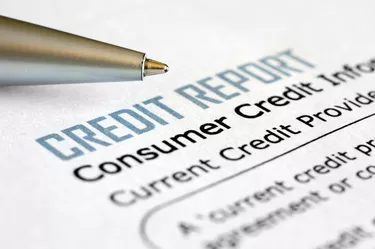
If you just negotiated with a creditor to settle a balance for less than what you owed, you may feel victorious, but such a settlement damages your credit score and might end up increasing your interest rates down the line. Whether a debt affects you depends on whether the account is reported "paid in full" or "settled in full" on your credit report. Take a look at the difference between a payment and settlement and the effects on your credit score and finances.
Settled in Full vs. Paid in Full
Video of the Day
To understand the difference between difference between settling and paying in full, understand that an account listed as "paid in full" means you paid off the entire amount due on a loan. "Settled in full" means you negotiated with the lender to pay off some amount less than what he gave you. This might happen on a an unsecured line, such as a credit card. The lender would rather receive something than let you dissolve the debt in bankruptcy or deal with the hassle of a court case.
Video of the Day
Impact on Your Credit Score
Debt settlement could be a huge drag on your score or a small setback compared to an overall poor credit profile. Generally, the higher your score, the more a debt settlement can affect your credit score, because you have more points to lose. If you already have poor credit, debt settlement might cost less than 45 points or less than a single missed payment.
Benefits of Settling Accounts
Negotiating a debt settlement does not mean you clear the account's history from your record. However, paying something to settle the account could improve your overall creditworthiness and might improve your score a little.
First, you lower your outstanding debt balance – 30 percent of your credit score. Second, lowering your debt balance improves your debt-to-income ratio. Lenders usually care just as much about your monthly debt payments as they do about your score, because you must be able to afford a loan for the risk to make financial sense for the creditor.
Tips for Settling Accounts
If you have accounts you hope to settle, try asking for a deletion of the account. You can ask for this before or after negotiations, but not after sending the creditor money. Once you cut a check, you lose all power in the negotiation. The point at which you ask for a deletion could impact your chance at getting a deletion.
The creditor might use your request for a deletion before starting serious negotiation as leverage to receive a higher settlement – asking early signals you care a lot about your credit score. However, it also saves you time and stress wondering if you can get the deletion.
When you ask after settling on an amount, you must send in a "conditional endorsement" with your payment. This usually results in the lowest settlement, but the creditor could reject the terms of the entire agreement. However, if the creditor accepts a "conditional endorsement," the worst that can happen is he deposits the check and fails to follow through on the agreement. You can then sue the creditor for breaking the agreement.